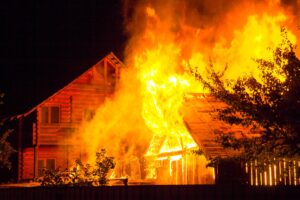
Introduction
Fire incidents can have devastating effects on rental properties, leading to significant financial losses and emotional distress for both property owners and tenants. Understanding how to effectively navigate the insurance claims process is crucial for property owners to ensure they receive adequate compensation and can promptly restore their properties.
In this article, you will learn:
- The importance of having separate fire insurance for rental properties
- Key aspects of insurance policies, including replacement cost vs. actual cash value
- Immediate actions to take post-incident
- Responsibilities of landlords and tenants after a fire
- Identifying hidden damages and strategies for smoke damage mitigation
- Effective communication with tenants throughout the claims process
- Legal obligations to maintain habitability standards
- The role of public adjusters in claim resolution
- Tips for successful claims submission after fire damage
This comprehensive guide aims to equip you with the knowledge needed to handle fire damage insurance claims effectively, protecting your investment and ensuring tenant safety.
Understanding Insurance Coverage for Rental Properties
Importance of Having Separate Fire Insurance for Rental Properties
Having a dedicated fire insurance policy for your rental property is crucial. Unlike standard homeowners insurance, fire insurance specifically covers damages caused by fire incidents. This ensures that you are adequately protected against significant financial losses resulting from fire damage to your rental property.
Key Aspects of Insurance Policies
When selecting a fire insurance policy, understanding the difference between replacement cost coverage and actual cash value is crucial:
- Replacement Cost Coverage: This type of policy pays for the cost to replace damaged property with similar new items without deducting for depreciation.
- Actual Cash Value: This policy type reimburses you based on the depreciated value of the damaged property. It often results in lower payouts compared to replacement cost coverage.
Common Exclusions and Limitations in Fire Insurance
Fire insurance policies come with certain exclusions and limitations. Common exclusions may include:
- Intentional Acts: Damages caused intentionally by the owner or tenant.
- Negligence: Failure to maintain the property properly, leading to increased risk of fire.
- Vacant Properties: If the property has been vacant for an extended period, some policies may not cover fire damage.
Understanding these exclusions and limitations is vital to ensure comprehensive coverage. Always review your policy details and discuss any concerns with your insurance agent to avoid unpleasant surprises during a claim.
Assessing Adequate Coverage and Claim Denials
Evaluating your current insurance policy is crucial to ensure sufficient coverage for fire damage. Start by reviewing the policy limits and comparing them to the potential costs of rebuilding or repairing your rental property. Pay attention to whether your policy offers replacement cost coverage, which reimburses the cost of replacing damaged property, or actual cash value coverage, which factors in depreciation.
Consequences of Inadequate Coverage:
- Out-of-Pocket Expenses: Insufficient coverage may result in significant personal expenses for repairs beyond the policy limits.
- Claim Denials: Policies with exclusions or limitations might lead to partial or full denial of claims.
- Extended Recovery Time: Delays in receiving adequate funds can prolong the time needed to restore the property, affecting rental income.
For example, if your policy only covers $200,000 but the actual repair costs total $300,000, you would be responsible for covering the $100,000 difference. Conducting a thorough coverage assessment can help avoid such financial pitfalls and ensure you’re adequately protected in case of fire damage.
Immediate Actions Post-Incident to Protect Your Investment
Prioritizing tenant safety immediately after a fire is crucial. Ensure all tenants have evacuated safely and check for any injuries. Coordinate with emergency services to confirm the building’s safety status before re-entering.
Once tenant safety is secured, contacting your insurance agent should be your next step. Provide them with a detailed account of the incident and follow their guidance on initial procedures. Your insurance agent can help you understand what information and documentation are necessary for filing a claim.
Conducting a thorough assessment of damages, once it is safe to do so, is essential. Take detailed notes and photos of all affected areas, including hidden damages such as smoke or water damage that might not be immediately visible. This documentation will be vital for your insurance claim.
- Tenant Safety: Evacuate tenants, check for injuries, liaise with emergency services.
- Insurance Agent Contact: Provide incident details, understand necessary documentation.
- Damage Assessment: Document visible and hidden damages through notes and photos.
These immediate actions set the foundation for a smoother claims process and protect your investment effectively.
Responsibilities of Landlords and Tenants After a Fire Incident
Landlord Responsibilities
Landlords bear the primary responsibility for repair costs associated with structural damage to the rental property. This includes:
- Restoring the property to a habitable condition as per local building codes.
- Repairing or replacing fixtures such as windows, doors, plumbing, and electrical systems that were damaged by the fire.
- Coordinating with insurance companies to ensure that all covered damages are addressed promptly.
Prompt action is crucial to prevent further deterioration and maintain compliance with habitability standards.
Tenant Responsibilities
Tenants are responsible for their personal belongings. Typically, renters insurance covers:
- Replacement of personal items like furniture, clothing, and electronics damaged in the fire.
- Temporary living expenses if they need to relocate while repairs are being made.
Understanding liability issues is also essential. If tenant negligence is determined to have caused the fire, they may be held liable for some or all of the damages. In such cases:
Tenants should review their rental insurance policies and consult legal advice if necessary.
Clear communication between landlords and tenants can mitigate misunderstandings about responsibilities and liabilities.
Identifying Hidden Damages and Smoke Damage Mitigation Strategies
Fire incidents often result in hidden damages that might not be immediately apparent. These can include:
- Smoke damage: Smoke can infiltrate walls, ceilings, and HVAC systems, causing lingering odors and potential health hazards.
- Water damage: The water used to extinguish the fire can lead to mold growth and structural weakening.
Conducting thorough inspections is essential. Engaging professionals for a detailed assessment can help identify all types of damage. Pay special attention to:
- Structural integrity: Ensure there are no compromised beams or walls.
- Electrical systems: Check for any short circuits or exposed wiring.
- Plumbing: Inspect pipes for leaks or breaks caused by heat.
Mitigating smoke damage in rental properties involves several strategies:
- Ventilation: Open windows and use fans to ventilate the area and remove lingering smoke particles.
- Cleaning surfaces: Use specialized cleaning agents for walls, ceilings, and floors to eliminate soot and stains.
- Air purification: Employ air purifiers with HEPA filters to capture airborne contaminants.
- Duct cleaning: Hire professionals to clean HVAC ducts, preventing the recirculation of smoke particles.
Understanding and addressing these hidden damages promptly ensures the property remains safe for tenants and prevents long-term issues.
Effective Communication with Tenants Throughout the Claims Process
Maintaining tenant communication is crucial during the claims process. Keeping tenants informed and engaged helps reduce stress and confusion.
Update Regularly
Provide frequent updates on the status of the claim and repairs. Clear communication about timelines can prevent misunderstandings.
Transparency
Be transparent about the extent of the damages and expected repair duration. This honesty builds trust and keeps tenants prepared for potential inconveniences.
Temporary Arrangements
If repairs necessitate temporary relocation, guide tenants through finding temporary accommodations. Inform them about their rights and any rental insurance benefits they might have.
Documentation
Encourage tenants to document their personal losses for their own insurance claims. This not only aids them but also streamlines your communication process.
Tenant satisfaction during this stressful time hinges on proactive and clear communication.
Legal Obligations After Fire Damage: Complying with Habitability Standards
As a landlord, it’s essential to know your legal obligations after fire damage. You need to make sure the property is safe and livable after a fire incident. Here are the key responsibilities you should keep in mind:
1. Immediate Repairs
Make sure to fix any structural damage right away. This will help prevent further deterioration of the property.
2. Habitability Standards
Check that all utilities such as water, electricity, and gas are working properly. Also, make sure there are no hazards like exposed wires or unstable structures on the premises.
3. Safe Living Conditions
If the rental unit becomes uninhabitable during repairs, provide temporary accommodation solutions for your tenants.
It’s important to comply with these obligations to avoid legal issues and potential conflicts with your tenants. By understanding these responsibilities, you can maintain a positive relationship with your tenants while also following local housing regulations.
The Role of Public Adjusters in Claim Resolution for Rental Properties
Public adjusters play a crucial role in the claim resolution process for rental properties affected by fire damage. Their expertise can make a significant difference in ensuring property owners receive fair compensation.
How Public Adjusters Assist Property Owners
1. Advocacy
Public adjusters act as advocates for property owners, representing their interests exclusively. Unlike insurance adjusters who work for the insurance company, public adjusters are hired by you to ensure your claim is maximized.
2. Comprehensive Assessment
These professionals conduct thorough inspections and document all damages, including hidden ones like smoke and water damage, that might be overlooked otherwise.
3. Expert Negotiation
With their in-depth knowledge of insurance policies and claims processes, public adjusters effectively negotiate with insurance companies on your behalf, aiming to secure the best possible settlement.
4. Documentation
They handle the intricate documentation required for filing claims, ensuring that all necessary evidence is collected and presented correctly to avoid denials or delays.
5. Stress Reduction
By managing the complex aspects of the claims process, public adjusters alleviate much of the stress and time commitment involved, allowing you to focus on other critical aspects of recovery and property management.
Employing a public adjuster can be a strategic move in navigating fire damage claims, ensuring that every aspect of your loss is accounted for and fairly compensated.
Filing Claims, Meeting Deadlines, and Tips for Successful Claims Submission After Fire Damage
Adhering to filing deadlines set by your insurance policy is crucial when submitting claims after fire damage. Missing these deadlines can result in denied claims, leaving you financially vulnerable.
Importance of Filing Deadlines
- Timeliness: Insurance policies often have strict timelines for reporting fire damage. Immediate action ensures your claim is processed efficiently.
- Policy Compliance: Adherence to deadlines shows compliance with policy terms, reducing the risk of disputes with the insurance company.
- Financial Impact: Timely filing helps in receiving funds quickly, which is essential for repairs and maintaining rental income.
Best Practices for Documentation and Evidence
Preparing comprehensive documentation and evidence increases the likelihood of a successful claim submission. Here are some best practices:
- Detailed Inventory:
- Create a list of all damaged property with descriptions and estimated values.
- Include receipts or proof of purchase when available.
- Photographic Evidence:
- Take clear photos and videos of all damaged areas and items.
- Capture different angles to provide a complete view of the extent of damage.
- Professional Assessments:
- Obtain written assessments from contractors or fire restoration professionals detailing the damages.
- Include repair estimates to support your claim.
- Witness Statements:
- Collect statements from tenants or witnesses describing the incident and its aftermath.
- These accounts can corroborate your damage report.
- Communication Records:
- Keep records of all communication with your insurance company, including emails, letters, and phone call logs.
- Document every step taken post-incident to demonstrate due diligence.
Proactive Steps for Successful Claims
- Early Notification: Inform your insurance agent or company as soon as possible after the incident.
- Organized Documentation: Keep all documents organized and accessible for quick reference during the claims process.
- Consistent Follow-Up: Regularly check on the status of your claim and respond promptly to any requests from the insurance company.
- Engage Professionals: Consider hiring public adjusters or legal counsel if disputes arise or if you need expert guidance in navigating complex claims.
By following these guidelines, you can enhance your chances of a successful claims submission after fire damage, ensuring that you protect your investment effectively.


